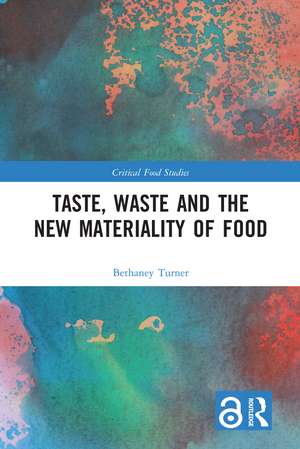Taste, Waste and the New Materiality of Food: Critical Food Studies
Autor Bethaney Turneren Limba Engleză Paperback – 30 iun 2020
Anthropocentric thinking produces fractured ecological perspectives that can perpetuate destructive, wasteful behaviours. Learning to recognise the entangled nature of our everyday relationships with food can encourage ethical ecological thinking and lay the foundations for more sustainable lifestyles.
This book analyses ethnographic data gathered from participants in Alternative Food Networks from farmers’ markets to community gardens, agricultural shows and food redistribution services. Drawing on theoretical insights from political ecology, eco-feminism, ecological humanities, human geography and critical food studies, the author demonstrates the sticky and enduring nature of anthropocentric discourses. Chapters in this book experiment with alternative grammars to support and amplify ecologically attuned practices of human and more-than-human togetherness. In times of increasing climate variability, this book calls for alternative ontologies and world-making practices centred on food which encourage agility and adaptability and are shown to be enacted through playful tinkering guided by an ethic of convivial dignity.
This innovative book offers a valuable insight into food networks and sustainability which will be useful core reading for courses focusing on critical food studies, food ecology and environmental studies.
| Toate formatele și edițiile | Preț | Express |
|---|---|---|
| Paperback (1) | 389.70 lei 6-8 săpt. | |
| Taylor & Francis – 30 iun 2020 | 389.70 lei 6-8 săpt. | |
| Hardback (1) | 1000.27 lei 6-8 săpt. | |
| Taylor & Francis – 15 noi 2018 | 1000.27 lei 6-8 săpt. |
Din seria Critical Food Studies
-
 Preț: 324.68 lei
Preț: 324.68 lei -
 Preț: 265.01 lei
Preț: 265.01 lei -
 Preț: 341.57 lei
Preț: 341.57 lei -
 Preț: 310.36 lei
Preț: 310.36 lei -
 Preț: 481.76 lei
Preț: 481.76 lei -
 Preț: 435.59 lei
Preț: 435.59 lei - 17%
 Preț: 245.03 lei
Preț: 245.03 lei -
 Preț: 436.14 lei
Preț: 436.14 lei - 18%
 Preț: 1006.77 lei
Preț: 1006.77 lei - 12%
 Preț: 312.43 lei
Preț: 312.43 lei -
 Preț: 386.00 lei
Preț: 386.00 lei -
 Preț: 385.54 lei
Preț: 385.54 lei - 18%
 Preț: 1000.27 lei
Preț: 1000.27 lei -
 Preț: 469.34 lei
Preț: 469.34 lei -
 Preț: 489.26 lei
Preț: 489.26 lei -
 Preț: 489.48 lei
Preț: 489.48 lei -
 Preț: 498.48 lei
Preț: 498.48 lei - 18%
 Preț: 1002.99 lei
Preț: 1002.99 lei -
 Preț: 469.34 lei
Preț: 469.34 lei -
 Preț: 469.34 lei
Preț: 469.34 lei - 17%
 Preț: 272.14 lei
Preț: 272.14 lei -
 Preț: 389.38 lei
Preț: 389.38 lei - 18%
 Preț: 1008.30 lei
Preț: 1008.30 lei - 30%
 Preț: 848.40 lei
Preț: 848.40 lei - 18%
 Preț: 1002.36 lei
Preț: 1002.36 lei - 18%
 Preț: 997.93 lei
Preț: 997.93 lei -
 Preț: 284.52 lei
Preț: 284.52 lei - 18%
 Preț: 886.04 lei
Preț: 886.04 lei
Preț: 389.70 lei
Nou
Puncte Express: 585
Preț estimativ în valută:
74.58€ • 80.98$ • 62.65£
74.58€ • 80.98$ • 62.65£
Carte tipărită la comandă
Livrare economică 22 aprilie-06 mai
Preluare comenzi: 021 569.72.76
Specificații
ISBN-13: 9780367583071
ISBN-10: 0367583070
Pagini: 246
Dimensiuni: 156 x 234 x 18 mm
Greutate: 0.45 kg
Ediția:1
Editura: Taylor & Francis
Colecția Routledge
Seria Critical Food Studies
Locul publicării:Oxford, United Kingdom
ISBN-10: 0367583070
Pagini: 246
Dimensiuni: 156 x 234 x 18 mm
Greutate: 0.45 kg
Ediția:1
Editura: Taylor & Francis
Colecția Routledge
Seria Critical Food Studies
Locul publicării:Oxford, United Kingdom
Cuprins
1. Introduction
2. An Appetiser: Eating, being and playing with convivial dignity
3. Introducing Taste
4. Growing a Taste for Togetherness
5. Taste In Shopping
6. Taste in Competition
7. Introducing Waste
8. Waste in the Home
9. Composting in the Home
10. Ugly Food and Food Waste Redistribution
11. New Grammars for the Anthropocene: Playful tinkering with convivial dignity
2. An Appetiser: Eating, being and playing with convivial dignity
3. Introducing Taste
4. Growing a Taste for Togetherness
5. Taste In Shopping
6. Taste in Competition
7. Introducing Waste
8. Waste in the Home
9. Composting in the Home
10. Ugly Food and Food Waste Redistribution
11. New Grammars for the Anthropocene: Playful tinkering with convivial dignity
Notă biografică
Bethaney Turner is an Assistant Professor in Faculty of Arts and Design at the University of Canberra. Her interdisciplinary research explores how more sustainable urban living behaviours can be developed and fostered in a time of human-induced climate change.
Descriere
Anthropocentric thinking produces fractured ecological perspectives that can perpetuate destructive, wasteful behaviours. Learning to recognize the entangled nature of our everyday relationships with food can encourage ethical ecological thinking and lay the foundations for more sustainable lifestyles. This book analyses ethnographic data gather
